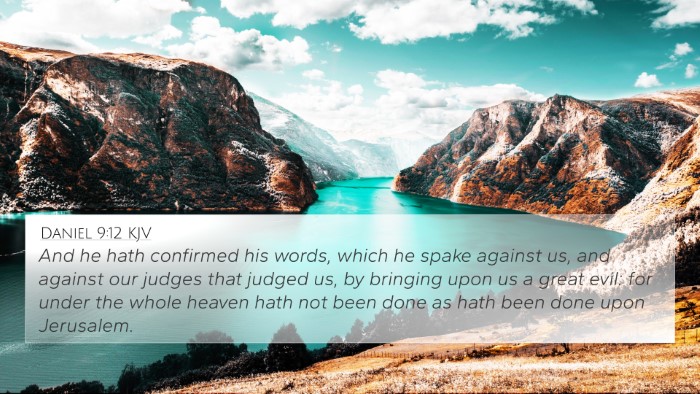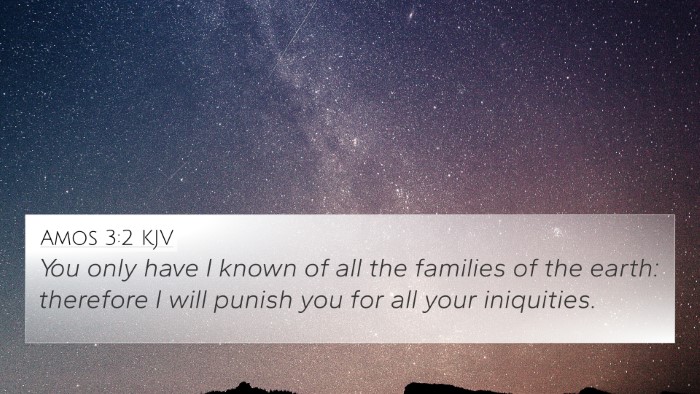Ezekiel 7:5 - Summary and Interpretation
Ezekiel 7:5 reads:
"Thus saith the Lord God; An evil, an only evil, behold, is come." (Ezekiel 7:5, KJV)
This verse is a part of a larger prophetic message from Ezekiel, conveying the impending judgment and calamity that was to befall Israel.
Meaning and Context
The passage emphasizes the certainty and severity of the judgment upon the nation. The repetition of "an evil, an only evil" signifies the singularity of the distress that God will unleash upon His people due to their persistent sin and unfaithfulness.
Insights from Public Domain Commentaries
Matthew Henry's Commentary
Henry notes that this verse denotes the imminent destruction that the people would face. He highlights the urgency in God's message, depicting that the evil is not just a random event but a direct consequence of their actions against God. The “evil” foreshadows a time when God would withdraw His protection, leading to great suffering among the people.
Albert Barnes' Notes
Barnes points out that the term “evil” refers to both moral and physical calamity. He interprets this verse as a warning to the people of Jerusalem that they would soon face disaster, not just from external enemies but as a result of divine retribution. According to Barnes, this reinforces the notion that God is sovereign over the fate of nations.
Adam Clarke's Commentary
Clarke emphasizes the prophetic nature of Ezekiel's message. He commentates on the term “behold,” indicating the immediacy and reality of the prophecy. Clarke indicates that the evil mentioned is a signal of the destruction due to the corruption within the nation. The use of “only evil” hints at the clarity and focus of the prophecy's intent – to warn and prepare the people for the fate that awaited them.
Bible Verse Cross-References
This verse connects with numerous others throughout both the Old and New Testaments, showcasing the comprehensive nature of God’s judgments and thematic connections in scripture. Here are some notable references:
- Isaiah 45:7 - "I form the light, and create darkness: I make peace, and create evil: I the Lord do all these things."
- Lamentations 3:38 - "Out of the mouth of the Most High proceedeth not evil and good?"
- Jeremiah 4:6 - "Set up the standard toward Zion: retire, stay not: for I will bring evil from the north, and a great destruction."
- Amos 3:6 - "Shall a trumpet be blown in the city, and the people not be afraid? Shall there be evil in a city, and the Lord hath not done it?"
- Matthew 24:21 - "For then shall be great tribulation, such as was not since the beginning of the world to this time, no, nor ever shall be."
- Luke 21:22 - "For these be the days of vengeance, that all things which are written may be fulfilled."
- Revelation 18:10 - "Standing afar off for the fear of her torment, saying, Alas, alas, that great city Babylon, that mighty city! For in one hour is thy judgment come."
Connecting Themes and Interpretations
The themes illustrated in Ezekiel 7:5 regarding judgment and calamity echo throughout the Bible, providing a rich tapestry of understanding when viewed collectively with other scriptures.
This connection emphasizes not only the consequences of sin but also the constant call to repentance found throughout the Biblical narrative. Each referenced verse offers insights into the nature of God's sovereignty and the significance of human morality.
Tools and Methods for Cross-Referencing
To fully appreciate these connections, utilizing tools for Bible cross-referencing, such as a Bible concordance or cross-reference Bible study guides, can enhance one’s understanding and facilitate deeper studies.
For instance, if you seek to identify connections between Old and New Testaments or conduct a comparative study of Pauline epistles, many resources like comprehensive Bible cross-reference materials provide systematic approaches to navigate these texts effectively.
Conclusion
In exploring Ezekiel 7:5 and its companions, readers are encouraged to delve into the notion that God’s messages, whether they carry themes of judgment or mercy, have profound implications for understanding faith and morality within Scripture. The links established through cross-referencing enrich the reader’s knowledge, reaffirming the intricate design of the biblical text.








